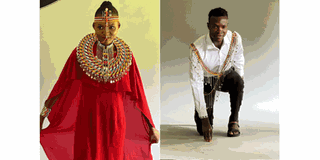Ushanga Initiative showcases Kenyan attire in Brazil Deaflympics

Some of the traditional Kenyan attire being showcased at the ongoing Deaflympics in Brazil.
What you need to know:
- Ushanga Initiative was started in 2017 to empower women from the pastoral communities.
- The initiative is presently empowering women across seven counties with 120 women cooperatives.
More than 200 Kenyan traditional attire have been showcased at the ongoing 24th Summer Deaflympics in Brazil, treating the world to a spectacular show of its kind.
The attire are original and authentic work of women from pastoralists and marginalised communities.
The beadworks project is run by Ushanga Initiative Kenya, an innovative journey that has however taken five years.
The women have been empowered to create masterpieces, marching various major events through training in value addition and using the latest techniques. At the same time, they preserve their rich heritage under the initiative, whose aim is empowering marginalized communities.
Ushanga Initiative was started in 2017 to empower women from the pastoral communities who have over the years displayed unique skills in beadwork.
For a long time, women from these communities did not have any other source of income or own any wealth, apart from the jewelry they made from the beadwork.
Most of what they made was for their own adornment during various festivals in their communities.
The aim of the government was to therefore empower them to be able to optimize their unique talent and create a wider market scope for them both locally and internationally. This is to help transform the living standards of the pastoralist women through commercialisation of beadwork.
According to Cabinet Secretary for Sports Amina Mohamed, the sharing of Kenya's creative work to the world has played a major role in promoting the national heritage.

Some of the traditional Kenyan attire being showcased at the ongoing Deaflympics in Brazil.
“This year, we not only take much pride in sending our well trained team to Brazil but also showcase our very rich, unique culture to the world,” Ms Mohamed said.
The Ushanga Initiative is presently empowering women across seven counties with 120 women cooperatives. The project is currently in place in West Pokot, Narok, Baringo, Samburu, Turkana, Marsabit and Kajiado Counties.
Ushanga CEO, Dorothy Mashipei, says the cooperative with the highest number has 7,000 members while the lowest has 100 members.
Ms Ronkai Learkora from Baringo County said through the cooperatives, women can now pay school fees for their children.
Caroline Dabalen from Marsabit County said the project has offered employment even to the youth.
“Initially, most youth in our region thought that if one missed out on joining the disciplined forces, there was no hope. Things have since changed, thanks to Ushanga Initiative,” she said.
Apart from using beadwork to empower women and giving them financial independence, Ushanga Initiative has used the same avenue to sensitize the women against the outdated FGM practice through Johari Beads Programme.
Johari is a Swahili word that means “jewel”, thus the girls are considered jewels that should not be subjected to the harmful cultural practices.
The programme works in partnership with United Nations Population Fund (UNFPA) and Anti FGM Board.
Johari was launched by President Uhuru Kenyatta in December 2019 as an anti-FGM campaign tool, while Johari bead bracelet was launched and upscaled in December 2021 by the First Lady Margaret Kenyatta.





